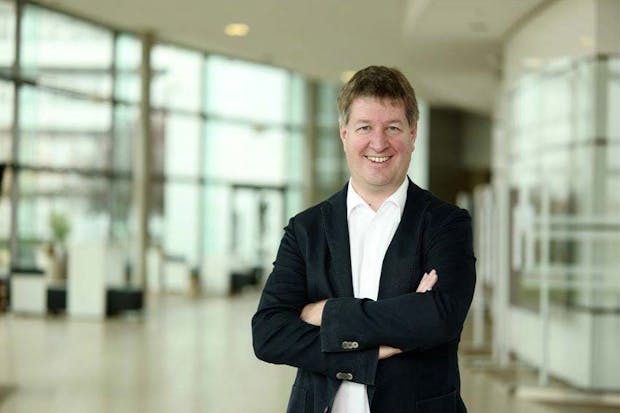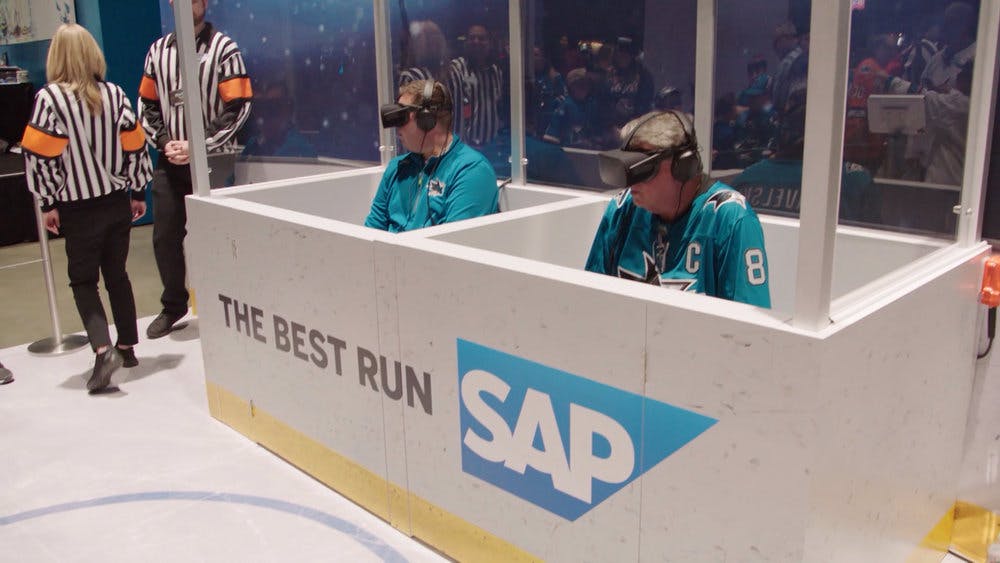
What’s important: To provide interesting ways to showcase the firm’s technology
Decision-making: Lars Lamadé, head of global sponsorships, together with executive board
Target sports: Ice hockey, basketball, American football, soccer, esports.
Target markets: US, Germany, UK, Asia
German multinational software company SAP has a substantial portfolio of sports sponsorship deals which includes the NHL, NBA, the New Zealand All Blacks, the Women’s Tennis Association and the San Francisco 49ers, as well as agreements with the Team Liquid esports outfit and various esports events and publishers.
In the US, the firm holds a stadium naming rights agreement with the SAP Arena, home of the NHL’s San Jose Sharks, and some smaller venue partnerships with MetLife Stadium, Madison Square Gardens in New York and the Chase Center in San Francisco
In its domestic market, the company is the jersey sponsor of German Bundesliga team Hoffenheim, a Platinum Partner of Bayern Munich, and holds a stadium naming rights agreement with the multi-purpose SAP Arena in Mannheim, and a venue partnership with the Elbphilharmonie in Hamburg. The company will also sponsor SAP Gardens, a new 11,500-seat indoor arena to be completed in Munich next year.
Lars Lamadé, head of global sponsorships, SAP, describes the company’s sponsorship strategy:
What’s important to you as a sponsor?
When we started sports sponsorships 25 years ago, with the McLaren team in Formula 1 – 1997-1998 was the first season we were engaged with them – it was mainly about hospitality and also, of course, a little bit about branding. But now, since the last 12 years, I would say it has changed significantly. These two aspects, branding and hospitality, are still important, but showcasing our technology has become the most important [aspect].
We look for partnerships where the partner is also using our products. Several years ago, our technology was not of interest for sports organisations, because we were targeting bigger or mid-sized corporations. Now, since our software has become a bit smaller and more digestible for smaller organisations – and in parallel, the sports organisations, the professional ones, have also developed the need for some small IT services – they have become relevant to us from a customer point of view.
Financial software is not usually something that excites people and makes them jump on their seats and give standing ovations. So therefore, we use sport to bring a little bit excitement. We offer our software to different industries, to 25 different industries, from automotive manufacturing, high-tech, insurance, banking, oil, and gas, chemical, and so on, and we usually have all of these industries sitting in a room when we present our products at events
When they see an example of the NBA using our software, or of Bayern Munich using our software, then that immediately creates the interest. This for us is really essential, to use our prominent partners as a reference for customers – and sometimes we have them speaking at our events.
What’s the decision-making process? Are most global deals organised centrally? Or do you do you devolve decision-making to regional SAP offices?
This is obviously a big debate because we have a global budget, and then there are always questions from the individual countries or market units: ‘What is in it for me from the global budget? Yes, the NBA is a global brand but I’m living in Spain, I would much prefer to have a tennis tournament in Spain or sponsor the local football club in Spain…’ This is always the discussion but more or less, with various exceptions, all the decisions are made by us in the global team.
And we do try to agree really global sponsorship deals. We sponsor the Cirque du Soleil because they are touring around the world, like the NBA, like the NHL, like Bayern Munich, like the All Blacks rugby team, which also acts like a global brand. Coldplay is a global brand [SAP worked with the band to develop an app for their recent world tour].
In the past, it was basically whoever had the budget could do something. But the company decided to take this freedom away and say everything has to fit in the overall structure and strategies defined by us. And so therefore, the number of local sponsorships is getting smaller and smaller.
It is an interesting discussion when you have naming rights for certain buildings, which are by definition more local in nature. When you sponsor Madison Square Gardens in New York, or Wembley Stadium in London, these could arguably be seen as a global brands. But when you have the SAP Arena [a multi-purpose arena] in Mannheim; SAP Garden [a planned 11,500-seat indoor arena] soon to be opened in Munich; and SAP Center in San Jose in the Silicon Valley, these are, of course, more local sponsorship assets. The SAP Center is basically the only landmark for SAP in Silicon Valley, where a lot of people recognise the SAP brand – and it’s super important for us as a software company to have visibility in Silicon Valley. So this is one of the strategic discussions we have with our executive board: should we still have some of these naming rights deals?
Do you have the final say on sponsorship decisions, or does the executive board also get involved?
We get the budget, we get the guidance from the board, what they are looking for, and then we come up with proposals within the budget. I think they have a good trust in us that we do meaningful things with the budget. But of course, when it comes to major partnerships, like the Coldplay or All Blacks deals, then definitely the board signs these ones off and the board, since they are also interested in sport, also have their own opinions and come back with ideas to us.
What do the New Zealand All Blacks do for SAP as a sponsorship platform?
We did the All Blacks deal because we have lots of partnerships in the US, lots of partnerships in Germany and the UK but we had no dedicated partnership for the Asian market. Obviously, we also activate all our partnerships in Asia. When Bayern Munich are traveling, they have promotional trips in July to certain regions, then we activate the partnerships over there. But we never had a partnership that was dedicated to the region. That’s why we decided to do the All Blacks, because they are very big in in Asia – they’re a worldwide brand but certainly very big in Australia, Japan, Singapore, and so on.
We understand your deal with the NHL expires next year. Is the plan to renew it?
We are in conversations with the NHL because we are super happy with the partnership. I was recently in Prague where they had two of their global games, which were the first games of the season for the San Jose Sharks and the Nashville Predators. We have a really a very good relationship with the NHL and we are extremely happy with our working collaboration, not only with how they are using our software, but also what kind of branding possibilities we have. So we’re very happy.
Which of your sponsorship deals would you say perform the best for you?
It depends how you measure success. So, for example, we sponsor the Elbphilharmonie in Hamburg. It’s a very small amount of money compared to the big deals with the NHL but as part of this partnership, we have the possibility once a year to perform our own concert there – determining who performs and all of the 2,000 tickets which are available, we can use to invite our employees and clients. We certainly get a benefit out of this. For a small amount of money, we can direct the sponsorship at hundreds of customers and partners.
And so it’s really difficult to compare different deals. There are lots of different aspects and lots of different measures of success. Some deals are purely hospitality-related, some are really technology-focused.
We have our own internal scoring model and whenever it comes to a renewal of a contract, we will sit together and have a look and decide if it was a good investment, or if we think we can do something with that budget which meets more criteria.

What benefits do you derive from your esports sponsorships?
We use quite a lot of our sponsorship events to help recruit talent, and this is especially the case in esports. We are looking for new young talent, and young talents are basically in the esports scene these days, not in a traditional sport anymore.
Do you work with any agencies?
In Europe, we work with Right Formula and Rapid Peaks in Munich. And in the US, we work with names like Optimum [Sports] or CAA, but we don’t have an exclusive agency anymore. We pick and choose because we felt that in the end with the agencies, it’s always based on the people. And there are very few agencies – and you saw that our portfolio is really big – that have knowledge and skills in all of these sports and categories.
Are you looking to strike any more sponsorship deals, to expand your portfolio in the near future?
Not that much. We have a pretty solid portfolio. We will only make some new ones – usually when something either expires or will be not renewed.